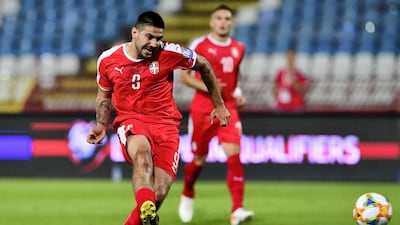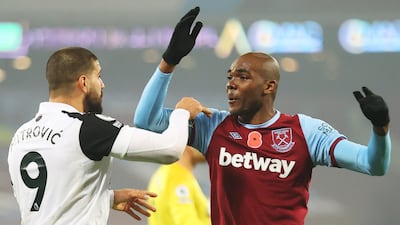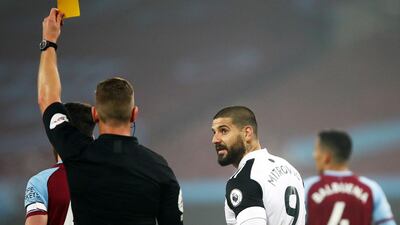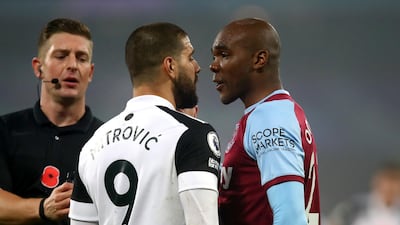On the face of it, it is a mismatch in terms of firepower. The 25-man squad Scotland pick their XI from for Thursday’s play-off for one of the last four remaining places at next summer’s European championship have a combined 24 international goals between them. Up front for Serbia, their opponents in Belgrade, is a centre-forward with 36 goals from his 59 caps.
The last 13 of Aleksandar Mitrovic’s strikes for his country have come from his last 11 internationals. It has been a peak year, coinciding with his emerging as the leading scoring in last season’s English Championship for Fulham who, for the second time in three years, won promotion to the Premier League on the back of Mitrovic’s marksmanship.
Granted, the 26-year-old has tended to find defences harder to unpick in England’s top division, and a career of several yo-yos between Championship and Premier League, with both Fulham and Newcastle United means Mitrovic is sometimes viewed as a specialist in second-tier success.
That need not be a slight on his abilities. “The Championship is the most attritional league probably in the world,” according to Scotland manager Steve Clarke, who selects several of his players from that division.
Attrition is Mitrovic’s sphere. He is physically imposing, pugnacious, a target man of old-fashioned virtues, strong in the air, with sharp elbows and a barrel chest. He has achieved a cult status at Fulham, and an authority with Serbia that shapes the way they attack.
Three more international goals and ‘Mitro’ will become the all-time highest scorer since Serbia became independent of Montenegro for football purposes in 2006. Success on Thursday and he would expect to enter his first Euros with that badge of honour fixed proudly to his broad torso.
The first colleague Mitrovic thanks if and when he reaches that milestone would be Dusan Tadic, the Ajax playmaker, key service-provider to Serbia’s target man. Four of Mitrovic’s last seven international goals have been set-up by Tadic. If Scotland are to shackle the Serbs, that connection likely needs severing.
“We need to be switched on defensively,” said Scotland captain Andy Robertson. “Mitrovic and Tadic can, in the blink of an eye, make something special happen.”
Scotland centre-half Liam Copper put it more bluntly. "Mitrovic is big and horrible and tough to play against," Cooper, a regular combatant in contests across Championship and Premier League between Cooper's United and Fulham, told The Daily Record.
The Scots recognise their underdog status. Not since the 1998 World Cup have they reached a major tournament finals. In that time Yugoslavia, including Serbia; then Serbia and Montenegro; and then a sovereign Serbia, have appeared at three World Cups and a European championship. Thursday's duel is between a team ranked 30th in the world by Fifa and visitors ranked 45th.
But there is a cautious optimism from the Scots. Under Clarke, appointed last year, Scotland have become harder and harder to beat.
They take a run of eight matches without defeat to the Red Star stadium.
While there may be no devastating penalty-box predator, no Mitrovic, among the likes of Lyndon Dykes, Callum Paterson, Oli McBurnie, Oliver Burke and Leigh Griffiths, they are well marshalled, tenacious, and capable of holding their nerve.
Scotland are in the final of this Uefa play-off path after a penalty shoot-out with Israel settled a stagnant 0-0 over 120 minutes.
Serbia took a more rollercoaster route, taking a lead, set up by Mitrovic, late on in their semi-final against Norway, conceding an equaliser two minutes from the end of normal time and winning 2-1 thanks to an extra-time goal from Sergej Milinkovic-Savic, the second of the match for the Lazio midfielder.
Milinkovic-Savic is among a clutch of players who won the under-20 World Cup with Serbia in 2015 and their generation expects to make an impact at a major tournament at some stage. The last senior World Cup was not it, Serbia ousted at the group phase.
Scottish impatience for creating memories on the big stage is far greater. Clarke, 57 years old and a grandfather, noted: “I was still playing the last time Scotland qualified. So it’s a very, very long time ago.
“There is a generation that has definitely missed that atmosphere and feeling you get as a nation when you get to one of these tournaments, that proud feeling. Hopefully this group can deliver.”










